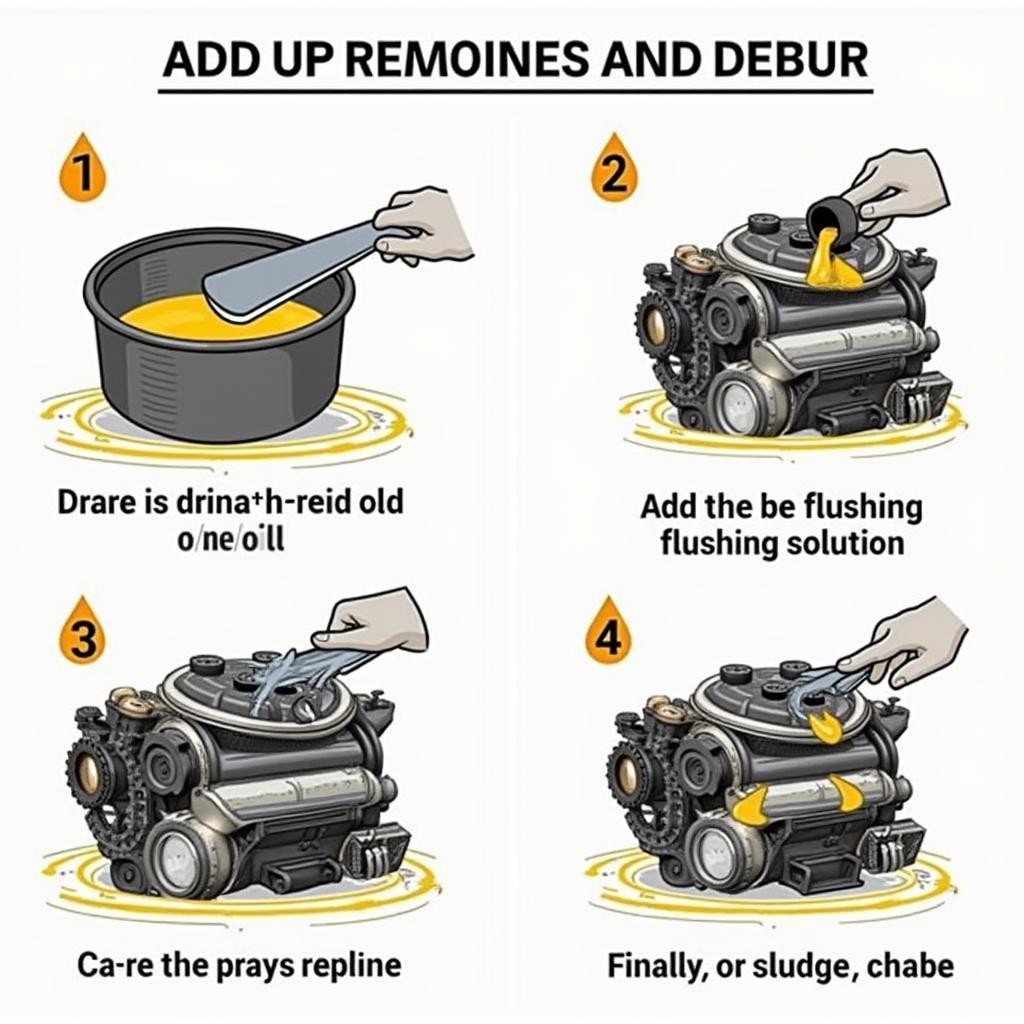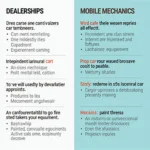An oil flush is a deep cleaning process for your car’s engine lubrication system. It involves removing old, contaminated engine oil and cleaning out sludge, deposits, and other impurities that can accumulate over time. This process goes beyond a standard oil change, aiming to restore engine cleanliness and improve performance. Learn more about What Is Oil Flush In Car Servicing and how it impacts your vehicle.
Getting your car serviced regularly is crucial for maintaining its performance and longevity. Find out more about when to service a car.
Why Would You Need an Oil Flush?
Over time, engine oil degrades, accumulating contaminants like dirt, metal particles, and combustion byproducts. These impurities can thicken the oil, reducing its lubricating effectiveness and potentially clogging oil passages. An oil flush aims to remove these contaminants, improving oil flow and protecting engine components.
How is an Oil Flush Performed?
Typically, an oil flush involves draining the old oil, adding a flushing solution to the engine, running the engine for a specific period (as per the manufacturer’s instructions), and then draining the flushing solution along with the dislodged contaminants. Fresh oil and a new filter are then installed.
Benefits of an Oil Flush
An oil flush can offer several benefits, including:
- Improved engine cleanliness: Removing sludge and deposits can restore engine performance and efficiency.
- Enhanced lubrication: Fresh, clean oil lubricates engine components more effectively, reducing friction and wear.
- Extended engine life: By removing harmful contaminants, an oil flush can help prolong the life of your engine.
- Quieter engine operation: Cleaner oil can lead to smoother, quieter engine operation.
Potential Risks of an Oil Flush
While generally safe, there are some potential risks associated with oil flushes, especially in older engines with significant sludge buildup:
- Dislodged debris: The flushing process can dislodge large chunks of sludge that could block oil passages, causing engine damage.
- Seal damage: Some flushing solutions can damage engine seals, leading to leaks.
- Compatibility issues: Using the wrong flushing solution can damage engine components.
Knowing the cost of car servicing is essential for budgeting. Check out how much is it to service your car.
Is an Oil Flush Necessary?
Whether or not you need an oil flush depends on several factors, including your car’s age, mileage, driving conditions, and maintenance history. For most vehicles, regular oil changes with quality oil are sufficient. However, if you have neglected oil changes or notice signs of engine sludge, an oil flush might be beneficial.
When Should You Get an Oil Flush?
- Neglected oil changes: If you have significantly delayed oil changes, an oil flush might be necessary.
- Used car purchase: An oil flush can be a good idea after purchasing a used car with an unknown maintenance history.
- Signs of engine sludge: Symptoms like reduced engine performance, increased oil consumption, or unusual engine noises could indicate sludge buildup.
“Regular oil changes are the best preventative measure. An oil flush should be considered a corrective action, not routine maintenance,” says John Smith, Senior Automotive Technician at Expert Auto Repair.
Oil Flush vs. Engine Cleaning
An oil flush focuses specifically on cleaning the engine’s internal lubrication system. Engine cleaning, on the other hand, typically refers to cleaning the exterior of the engine to remove grease and grime. While both improve cleanliness, they address different areas of the engine.
Understanding what PMS car services entail is essential for proper vehicle maintenance. Learn more about what is pms car services.
How Much Does an Oil Flush Cost?
The cost of an oil flush varies depending on the service provider, vehicle type, and location. It typically costs more than a standard oil change.
Alternatives to an Oil Flush
If you’re concerned about engine sludge but hesitant about a full oil flush, consider more frequent oil changes with high-quality oil. This can gradually clean the engine over time.
“While an oil flush can be beneficial in specific situations, it’s crucial to consult with a qualified mechanic to determine if it’s the right choice for your vehicle,” advises Maria Garcia, Certified Mechanic at Quality Car Care.
Conclusion
An oil flush is a deep cleaning process for your car’s engine lubrication system, removing sludge and contaminants to improve performance and engine life. While it can be beneficial in certain situations, it’s important to weigh the potential risks and consult with a qualified mechanic to determine if it’s necessary for your vehicle. Knowing when to service your car is key, and you can find more information at when to give my car for a service.
FAQ
- How often should I get an oil flush? Most cars do not require regular oil flushes. Consult your mechanic based on your driving conditions and maintenance history.
- Can I perform an oil flush myself? While possible, it’s recommended to have it done by a qualified mechanic to avoid potential damage.
- What are the signs I need an oil flush? Reduced engine performance, increased oil consumption, or unusual engine noises could indicate a need.
- How long does an oil flush take? It usually takes about an hour, depending on the vehicle and the service provider.
- Is an oil flush covered under warranty? It depends on the warranty terms and the reason for the oil flush.
- What’s the difference between an oil change and an oil flush? An oil change replaces the old oil with new oil. An oil flush involves cleaning the engine’s internal lubrication system.
- What type of oil should I use after an oil flush? Always use the oil recommended by your vehicle’s manufacturer. You can also learn if you haven’t serviced car for two years in tamil.
Need more help with car servicing? Explore our resources on our website.
Need immediate assistance? Contact us via WhatsApp: +1(641)206-8880, or Email: [email protected]. Our customer service team is available 24/7.


